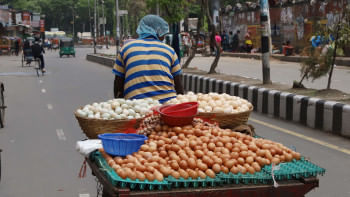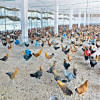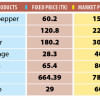Hold on, let's talk about price hikes

Hold on. Two innocuous words, innocently spoken. Or so it seemed. No sooner had an aged businessman in the port city's wholesale market uttered these words to stop some people rummaging through his import documents, the magistrate leading a mobile court reacted sharply, "What did you just say? You cannot say 'Hold on' to an on-duty magistrate." The official felt that the businessman had impugned his court's dignity with such flippant disregard for propriety.
A sense of disbelief visited the businessman as he tried to understand where it all went wrong. After all, when the magistrate told him what he should have said in Bangla, it literally translated to "Wait a bit; hold on." Angered by the casual utterance, the officer left the scene. But the issue is more than this blatant affront to decorum. The officer was investigating the reason why the market price of a particular condiment was four times higher than the imported price of the wholesaler. The magistrate raided the offices of various wholesalers and found that there were serious anomalies in bookkeeping.
We understand the cost of a product is linked to a host of issues, including increased production costs such as raw materials, labour and fluctuations in the global market. But what we don't understand is the government policies that frequently allow monopolistic practices and a lack of competition, leading businesses to take advantage of consumers by raising prices.
He couldn't hold back his anger, as he felt that the informal phrasal verb "hold on" was used to slight the sanctity of his office. TikTok picked on this reaction but failed to understand that the skit is more than business communication 101, where one learns formal and informal registers of language. The longer version of the video, available on an online news channel, mentions the culprits that the businessman identified for the price hike. The calculation that the magistrate did was to estimate that the per kilo price of cardamom, imported at a cost of Tk 800, should be sold at a maximum cost of Tk 1,700, taking all additional charges and expenses into consideration. Yet the wholesale marketer is selling it for Tk 2,400, and the retail price goes up to Tk 3,000-3,200. The businessman held it against a group of agencies where he needed to pour money for his trade. The magistrate holding out for something better had to hold on to some unpleasant facts that held down the price check missions.
Should we hold it against the magistrate for his poor linguistic judgement, or against the businessman for his manipulation of the market? The focus seems to be more on the former as the insistence on decorum sounded pompous. The conversational tone could have been exploited to give the businessman confidence to further probe into the names and agencies that would have given us a true picture of the syndicate that we often hear about. Instead, by losing his temper, albeit deliberately, the magistrate walked away from unearthing the real reason why we consumers are paying four times more than the imported price of an item.
Often, we hear people in high places suggesting alternative diets for us to avoid items whose prices have shot up for one reason or another. Their failure to stop the prices from skyrocketing makes them adopt the damage control mode, in which pumpkins are suggested instead of eggplants, local plums are suggested instead of grapes—the list continues. While these statements keep us entertained for a while, they do not feed us. Consumers hardly feel any sympathy for the downsizing that they have to experience due to price hikes. And all we get is haughtiness all around.
We understand the cost of a product is linked to a host of issues, including increased production costs such as raw materials, labour and fluctuations in the global market. But what we don't understand is the government policies that frequently allow monopolistic practices and a lack of competition, leading businesses to take advantage of consumers by raising prices. When magistrates raid a business concern with their mobile courts, as consumers, we hope to get information so that we can educate ourselves on these factors in order to protect us from exploitation and make informed purchasing decisions. The magistrates, along with the consumers' association, can advocate for fair competition and transparency in pricing, creating a more ethical and consumer-friendly economic environment. But the dramas that happen during these raids end up diluting the issues. We get distracted from the vicious cycle of price hikes caused by business greed aimed at profit maximisation that deprives consumers of fair prices.
Recently, a butcher from Dhaka's Khilgaon area came into the limelight for the fair price at which he was selling his beef. Khalil is selling each kilo of beef at Tk 595, while others are selling at Tk 750. In the first two days of Ramadan, Khalil sold a house worth Tk 1 crore. His initiative has already earned the trust of his consumers, as hundreds of people queue up every day to buy from him. He was even quizzed by the consumers' association, in which other sellers questioned the way Khalil had dropped his price. Khalil has shown how profits can be made by increasing sales, not necessarily by charging high prices. His sustainable practices have shaped consumer behaviours, much to the chagrin of the corporate houses that sell beef at a premium price. Khalil's smart business practice is getting social media traction, and he is getting free publicity.
One good thing about social media is that it has opened up avenues for consumers to fact-check or get user opinions before purchasing a product. Their conscious decision to buy certain products can push back against price hikes and business greed. But consumers cannot achieve this alone. We need sincere policy-level interventions and implementing agencies. We need officers with an egalitarian outlook who will prove their sincerity in curbing the prices not by moving with a media trail for an instant media trial, but by holding meaningful communication with the stakeholders. The officers need to hold on to the dignity of their offices by upholding what is required of them as civil servants: service of the highest standard.
Dr Shamsad Mortuza is professor of English at Dhaka University.
Views expressed in this article are the author's own.
Follow The Daily Star Opinion on Facebook for the latest opinions, commentaries and analyses by experts and professionals. To contribute your article or letter to The Daily Star Opinion, see our guidelines for submission.


 For all latest news, follow The Daily Star's Google News channel.
For all latest news, follow The Daily Star's Google News channel. 










Comments